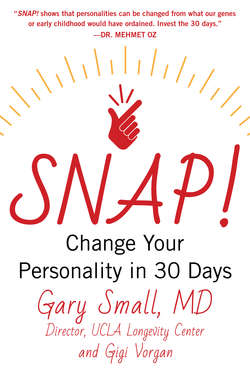Читать книгу SNAP! - Gary Small - Страница 20
На сайте Литреса книга снята с продажи.
Considering
ОглавлениеSomeone in the considering phase is not quite ready to change or adopt new behaviors, but they are inching toward a state of readiness. At the beginning of this phase, people typically make excuses for keeping their lives at the status quo: “I don’t really need that many friends; I’m fine on my own” or “I know I’m constantly late for things, but my dad was like that too.” When more closely examined, such excuses are merely a way of skirting the emotional work necessary to make a personality change.
At the beginning of the considering phase, many people already recognize that their behavior is a problem, but they don’t think it’s possible for them to change. When they envision altering their behaviors, it all seems too complicated or daunting. They aren’t yet motivated enough to go for it; however, maintaining the status quo is no longer working in their lives.
When my neighbor Shirley was still in graduate school, she went to a therapist for her anxiety issues. However, the therapist kept delving into Shirley’s early childhood, which made her feel even more anxious, so she gave up and assumed that no form of psychotherapy would ever help her.
Often someone’s previous failed attempts at change can reinforce this kind of thinking. Shirley’s first try at therapy failed, so she allowed that to become a barrier against any change at all. Individuals in the considering phase often create imagined barriers that serve as excuses to remain stuck in old, unproductive patterns.
Transitioning through this stage involves identifying strong motivators as well as pinpointing and overcoming one’s barriers. Some people stay in the considering phase for long periods, remaining ambivalent about whether the effort is worth it to them, and they are not yet motivated enough to try.
It wasn’t until recently that Shirley’s escalating anxiety symptoms began affecting her health—her asthma was worsening and she was developing irritable bowel syndrome. Her declining health supplied the motivation she needed to make a change. She found a behavioral psychologist who did not delve into her childhood but instead focused on the here and now. This time therapy made Shirley feel better instead of worse, and she was able to discover the root of her anxiety and overcome it.
Connecting with other people who have made successful changes in their lives can also be very motivating. Many studies have shown that when we spend time with people who engage in healthy behaviors, we are more likely to engage in those behaviors ourselves. If your goal is to become more agreeable, hanging out with other agreeable people will no doubt help you achieve that goal.
Once my friend Jackson accepted that he needed to change his eating habits and start exercising, he entered the considering phase of change—not quite ready to meet me at the gym, but beginning to formulate a plan to move forward. I advise patients in this phase to begin thinking about small but achievable goals for themselves and to work on understanding the feelings behind their barriers to change.
